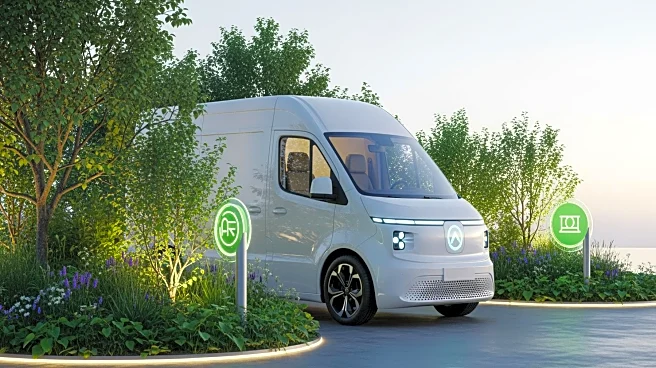What's Happening?
Amazon is significantly expanding its electric vehicle fleet in the UK as part of its global initiative to reach net-zero carbon emissions by 2040. The company is adding nearly 1,000 new electric vans
and heavy-goods trucks to its transportation network. This includes 160 electric heavy-goods vehicles (eHGVs), marking the largest single order of eHGVs in the UK. These vehicles will play a crucial role in transporting products between Amazon's logistics hubs across the country. The expanded fleet is expected to travel the equivalent of more than 450 trips around the Earth annually, carrying over 300 million products.
Why It's Important?
Amazon's investment in electric vehicles is a significant step towards reducing carbon emissions in the transportation sector, which is a major contributor to global pollution. By expanding its electric fleet, Amazon is setting a precedent for other companies to follow in the pursuit of sustainable logistics solutions. This move not only supports Amazon's environmental goals but also aligns with broader industry trends towards decarbonization. The initiative could influence policy decisions and encourage further investments in electric vehicle infrastructure, benefiting both the environment and the economy.
What's Next?
Amazon's commitment to achieving net-zero carbon emissions by 2040 will likely lead to further expansions of its electric vehicle fleet globally. The company may also invest in developing charging infrastructure to support its growing fleet. As Amazon continues to innovate in sustainable logistics, other companies may follow suit, potentially leading to increased competition in the electric vehicle market. Additionally, regulatory bodies might implement policies to support such initiatives, further accelerating the transition to greener transportation solutions.
Beyond the Headlines
Amazon's expansion of its electric vehicle fleet highlights the growing importance of corporate responsibility in addressing climate change. This initiative could lead to long-term shifts in consumer expectations, with more customers prioritizing environmentally friendly practices when choosing where to shop. Furthermore, the move may prompt discussions on the ethical implications of corporate environmental strategies and their impact on global sustainability efforts.









